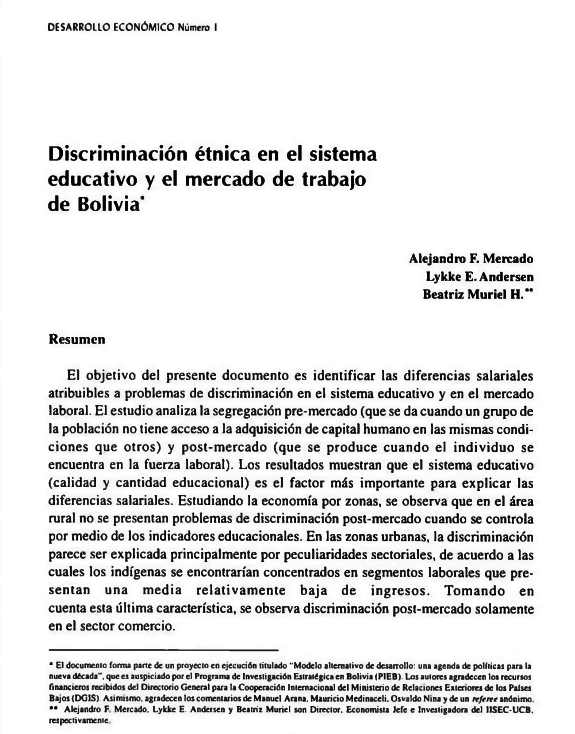Ethnic discrimination in the education system and the labor market in Bolivia
DOI:
https://doi.org/10.35319/lajed.20031337Keywords:
Salary, Labor market, Wage Differentials, Educational systemAbstract
The objective of this document is to identify the wage differences attributable to problems of discrimination in the education system and the labor market. The study analyzes the pre-market segregation (which occurs when a population group does not have access to the acquisition of human capital under the same conditions as others) and post-market segregation (which occurs when the individual is part of the labor force). The results show that the educational system (quality and quantity of education) is the most important factor in explaining wage differences. Studying the economy by areas, there are no problems of post-market discrimination in the rural area when it is controlled by educational indicators. In urban areas, discrimination seems to be mainly explained by sectoral peculiarities, according to which indigenous people would be concentrated in labor segments that present a relatively low average of income. Taking this last characteristic into account, post-market discrimination is observed only in the trade sector.
Downloads
References
Altonji, G . J. y R. M . Blank. 1999. “ Race and Gender in the Labor Market". En O. Ashenfelter y D. Card (eds.) Handbook of Labor Economics 3c: 3143-3259.
Andersen, L. E. 2001a. "Wage Differentials between Bolivian Cities” . Economía Política, Vol. II (1): 48-62. Agosto.
Andersen, L. E. y B. Muriel. 2002. "Cantidad versus calidad en educación: implicaciones para la pobreza". Revista de Estudios Económicos y Sociales 1:9-41.
Andersen, L. E. 2001b. "Low Social Mobility in Bolivia : Causes and Consequences for Development". Kiel Institute of World Economics, Kiel. Working Paper N ° 1046. May.
Becker, G. 1971. The Economics of Discrimination. The University of Chicago Press, Chicago, IL.
Card, D. y A . Krueger. 1990. "Does School Quality Matter? Returns to Education and the Characteristics of Public Schools in the United States". Princeton University. Working Paper N ° 265.
Fields, G. S., J. B. Leary, L. F. Lopez-Calva y E. Perez -de-Rada. 1998. "Education’s Crucial Role in Explaining Labor Income Inequality in Urban Bolivia ". Harvard Institute for International Development. Discussion Paper N ° 658. October.
Gadea Villalobos, O. S. 2001. "Discriminación racial en el mercado laboral boliviano: sus efectos sobre el ingreso y oportunidades de empleo". N ° 596 de la Colección de Tesis de Licenciatura en Economía de la Universidad Católica Boliviana. La Paz, Bolivia.
McConnel, C. R. y S. L. Brue. 1997. Economía laboral contemporánea. España: McGraw Hill.
Moensted, T. 2000. “ Wage Differentials between the form al and the informal sector in Bolivia ". Documento de Trabajo N ° 2/2000. IIS E C -U C B. La Paz.
Pérez de Rada, E. 1997. "Discriminación salarial por género y etnia en ciudades principales de Bolivia". Documento de trabajo N° 47/97. U D A P S O. La Paz.
Rivero, R. y W. Jiménez. 1999. "Diferencias salariales en el mercado de trabajo urbano en Bolivia , 1981-1997". Revista de Análisis Económico, volumen 17, UDAPE.






